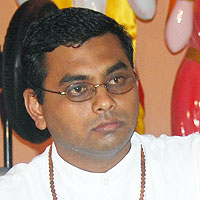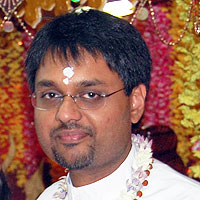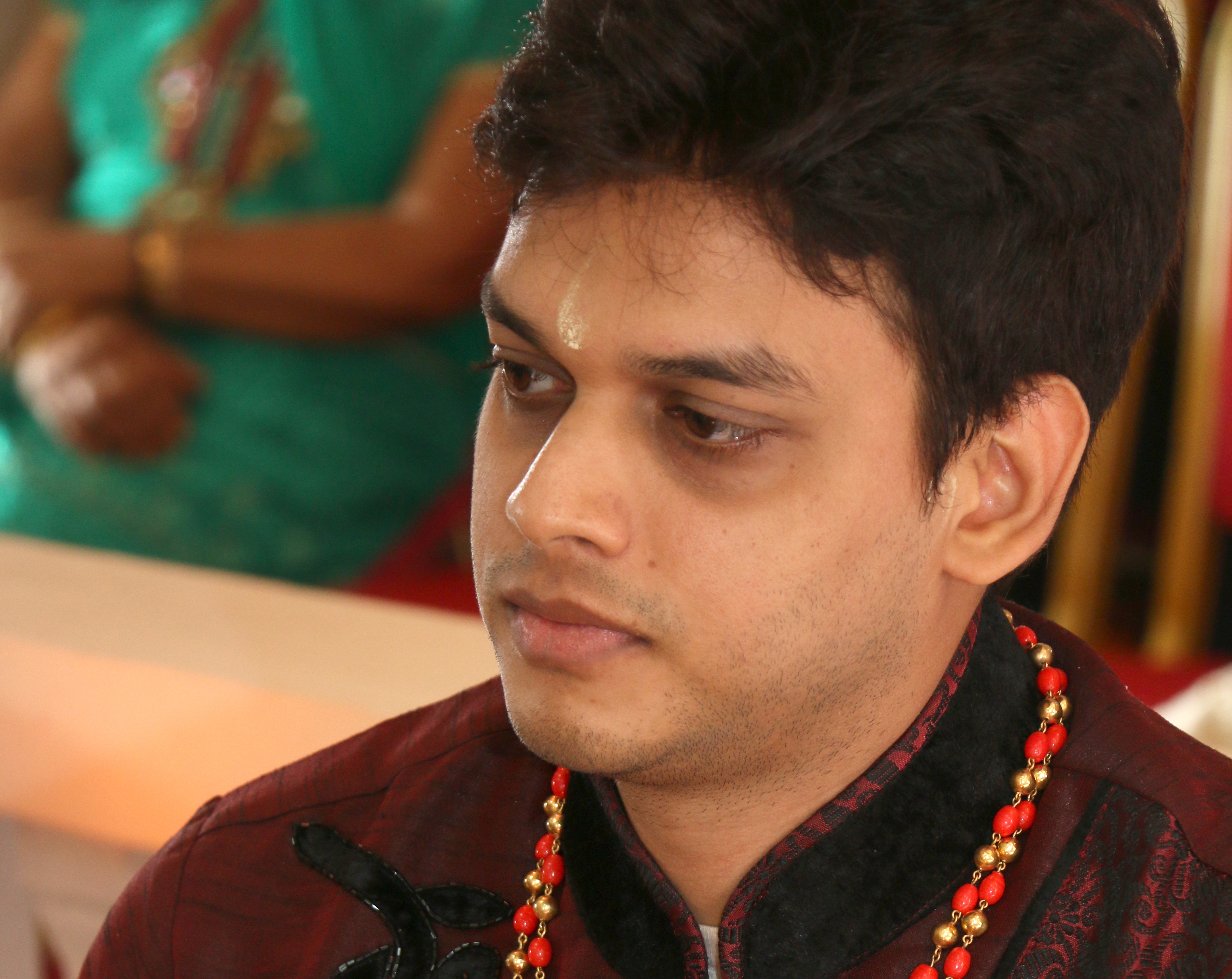Pt. Umadutt Maharaj, Spiritual Leader, SWAHA Bhakti Jyot Mandali and Sanatan Brahm
The following are verses from Chapter 6 (verses 5, 6 & 7) of the Bhagavad Gita:
uddhared ātmanātmānaṁ nātmānam avasādayet
ātmaiva hyātmano bandhur ātmaiva ripur ātmanaḥ
Elevate yourself through the power of your mind, and do not degrade yourself, for the mind can be the friend and also the enemy of the Self.
bandhur ātmātmanas tasya yenātmaivātmanā jitaḥ
anātmanas tu śhatrutve vartetātmaiva śhatru-vat
For those who have conquered the mind, it is their friend. For those who have failed to do so, the mind works like an enemy.
jitātmanaḥ praśhāntasya paramātmā samāhitaḥ
śhītoṣhṇa-sukha-duḥkheṣhu tathā mānāpamānayoḥ
The yogis who have conquered the mind rise above the dualities of cold and heat, joy and sorrow, honour and dishonour. Such yogis remain peaceful and steadfast in their devotion to God.
In verse 5, Shree Krishen Bhagavan tells us that man elevates or degrades himself by his own effort. One is one’s own friend and one is one’s own enemy. These verses form the basis of life. As a human being, out of all the 8,400,000 species of creation, the human form is the highest. The human being has the ability to analyse, rationalise and make conscientious decisions. We do not operate on instinct only as animals. As individuals, we need to bring our body, mind and senses under control through the constant contemplation upon Divinity. We need to practise and cultivate within ourselves dispassion and discriminative power, vairaagya and vivek, principles represented by Bhagavan Shankar and Shree Ganesh. By performance of such actions, the mind becomes disciplined. The body, senses and mind collectively constitute the self.
When the mind is unruly, running upon objects of a materialistic nature, then these truths cannot be applied. If we become slaves to the senses, due to egoism and feelings of possession, attraction and repulsion, lust, anger, greed, hatred, infatuation, and so forth, we fall victim to errors. When we are unable to perform proper actions that elevate ourselves, then we are bound by the shackles of sinful acts. This is followed by suffering and misery and we are robbed of our spirituality. We cannot elevate ourselves. However, Krishen Bhagavan says that no one hates oneself purposefully. It is through ignorance, pride and attachment that we begin to see evil as good, suffering as happiness.
The materialistic aspects of life must come to an end at some point. They are important to our existence but we must remember that they are temporary. We might be happy, but do we have peace of mind? We are bound in this world by the ignorance of attachment to the unreal. Krishen Bhagavan says, by the performance of such duties, we take the unreal to be real, and we neglect the real. The very self behaves antagonistically as his own enemy. So, when we do not understand the nature of the human form, we live in a pond of filth. To rise above this, we need to be like the lotus flower. It represents perfection; it lives in the pool of mud, in the midst of impurities, but it extracts the nutrients from the soil and leaves behind the impurities.
The next verse advises on how we should proceed with the performance of such an action, after bringing the body, mind and senses under control. A person, who has mastered this, is his own friend. The Supreme Spirit is rooted in the knowledge of the self-controlled individual, whose mind is perfectly serene, in the midst of pairs of opposites, such as cold and heat, joy and sorrow, honour and ignominy. These opposites represent all worldly objects, experiences and events, connected with the body, mind and senses. In the words of the Paramacharya, life is the sum total of experiences. Only with the human form can we have that spectrum of experiences. The state of mind to which we refer is one in which contact with or passing away of any object or experiences do not produce an unhealthy reaction on that mind; that is a mind that is disciplined. It is a mind that is free of aversion or attraction to this world; a mind that is not attracted to negative experiences; joy, desire, grief, fear, jealousy, lust and anger do not contaminate this mind. The mind remains firm, stable, equipoised and unruffled under all circumstances. A mind that has experience with the Self, is all positivity, free from the attractions of this world that bind us and pull us down. This does not mean giving up everything. There are four stages of life in Hinduism: Brahmacharya or student stage, 0 to 25 years; Grihastha or householder stage, 25 to 50; Vanaprastha or detachment stage between 50 and 75 where we start to let go and Sannyasa or the renunciate stage. We must cultivate and practise vivek and vairaagya, the ability to let go of the world.
When hunters wish to catch a monkey, they secure a jar in the ground with a fat base and thin, long neck. They place in the jar, the foods that the monkey likes. The monkey is able to slip his hand in the jar but once he grasps the food, he is unable to remove his hand. In order to escape, he must release the food. Similarly, the mind cannot elevate itself unless it frees itself of negative qualities. The elevated person is one whose mind and senses are under control; who turns the negatives into positivity and who is free from aversion and attraction. Desire is like ghee, the more you put into the fire, the bigger the flame. So when we offer the coconut into the fire for Nav Raatri, we ask the Divine Mother, Durga Maa, to burn away all our subtle desires. We ask that whatever desire is in the mind, may it not bind me to this world. May I be able to free myself from it as represented by Bhagavan Shankar, the ability to let go, detachment.
He who has mastered his body, mind and senses, can remain calm at every time and under any circumstance and can realise God and thereby redeem himself from this ocean of mundane existence. As with Krishen Bhagwan’s chariot, the horse does not guide the chariot where it wants to go, Krishen Bhagwan guides the horse; so too with the senses. When we have the senses under our control, we can guide them. We must master the body and its five sheaths: annamaya kosha (the food sheath, praanamaya kosha (the air sheath), manomaya kosha (the mind sheath), vigyaanamaya kosha (the knowledge sheath) and anandamaya kosha (the bliss sheath).
Mitaahara, control of diet, is important to control the food sheath, this human form. The type of food we eat affects the way we think and feel. We must avoid the negativities and develop the positive virtues; then we are a friend to ourselves. In the eyes of such an individual, God is ever present. Shree Raam said we blame time, karma and God, but we are responsible for ourselves. The body is like a field; the mind is like the farmer. We can plant two seeds: paap or punya, sin or virtues. We have to decide what we wish to plant. We are the atma trying to merge with the Paramatma, the Supreme Spirit, but we are deluded and contaminated by the world because of the maaya ke jaal (the net of illusion). We need to rise above the world, living in it, performing our duties and dharma, but not contaminated by it. If we live by these principles, our life will be a Divine Song.
Extracted from an online satsang



